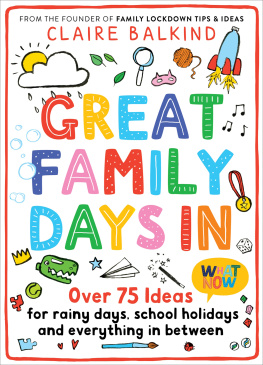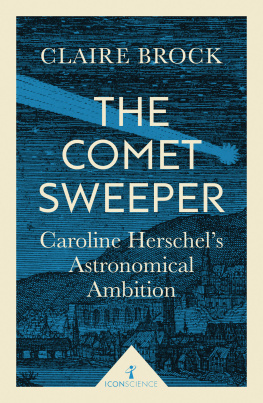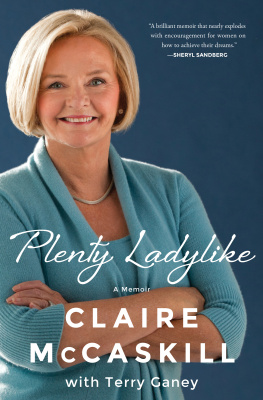Thank you for downloading this Simon & Schuster eBook.
Join our mailing list and get updates on new releases, deals, bonus content and other great books from Simon & Schuster.
C LICK H ERE T O S IGN U P
or visit us online to sign up at
eBookNews.SimonandSchuster.com
Contents
To my mother and father
who made me believe that ambition, strength, confidence, opinions, and yes, bossiness were all ladylike
CHAPTER ONE
Blonde Ambition
S treet after street, door after door, I walked and knocked. Hello, Im Claire McCaskill, and Im an assistant prosecutor. Im running for state representative, and Id appreciate your vote.
I was twenty-eight years old, single, a renter with no money or political organization backing me up. It was 1982, and I was a young prosecutor with courtroom experience who was comfortable making a case and doing hard work. When I ran for my first political office, a seat representing part of Kansas City in the Missouri House, people told me I needed to knock on doors. I knocked on 11,432 of them.
While I remember many of these encounters, one has replayed itself in my head hundreds of times over the years. It was dusk on an early summer evening as I approached a small Tudor in a modest neighborhood. Id been knocking for several hours by the time I reached this house. A man in his upper-middle years opened the door, and I rattled off my greeting. He looked me over slowly, up and down, and said, Youre too young. Your hair is too long. Youre a girl. No way are you tough enough for politics. Those politicians in Jeff Cityd eat you alive. Go find yourself a husband.
And he slammed the door in my face.
I won that raceand I kept on running for the next thirty years.
From a very young age, I was driven. In school I spoke up so much I earned the nickname Motor-mouth McCaskill. I didnt want to just get As; I wanted to win every spelling contest. I didnt want to be just a cheerleader; I wanted to be captain of the squad. Until I got to college I didnt realize that such drive wasnt always socially correct. My parents had done an amazing job of protecting me from a very dangerous point of view: that women should not be ambitious.
My mom, Betty Anne McCaskill, emphasized early on that women can do anything men can do. She refused to let me and my sisters, Anne and Lisa, get a Barbie, Queen of the Prom board game when we were young. To win the game you had to get a dress and a boyfriend and go steady. Dumb game. That is not how you win anything, she told us. While she never discouraged marriage, she and Dad both reinforced the need for us to first be self-sufficient. In that sense, my parents were way ahead of their time in stressing independence. My dads words still ring in my ears: You cant find happiness with someone else until you are happy with yourself. My dad, Bill, gave me the gift of incredible respect for a sense of humor. Even while I was ambitious, the people in my household taught me not to take myself too seriously. And as the most important male figure in my life, my father also gave me permission to be bossy and opinionated.
When I was in high school, I encountered my first situation where I had to choose whether to go along and be popular or to speak out even though I risked alienating some of my friends. The social sorority to which I belonged had always used popularity as the only measure for inclusion. I took the risk of saying that it might be a good idea to look at grades and school activities and maybe work for a little diversity if we were really focused on service as much as prestige. I felt strongly about this, and it hurt when my friends turned against me. That evening, as I was crying in my room, Dad quietly told me to snap out of it. He asked me to choose whether I wanted to be a leader or a follower, pointing out that followers never got their feelings hurt, but leaders always do. He told me one of his corny jokes and made me laugh. That was the year that Dad gave me John F. Kennedys book Profiles in Courage for Christmas.
Each year Dad encouraged me to enter the American Legion speech contest at West Junior High School. Though I made the finals in seventh and eighth grade, I never won. The contest required memorization of the speech, no notes allowed. One of those years I had the traumatic experience of forgetting my speech in front of the entire student body. Part of me wanted to sit out the competition in ninth grade, but a bigger part wanted to win. Dad and I talked about it and decided that my topic for this last try needed to be something I felt strongly about. I chose to give a speech about the Ku Klux Klan. He had me research the KKK, and we decided together that their offensive and repugnant oath would be a dramatic beginning to the speech.
I can recall exactly how I felt standing alone at the podium, and I remember where Dad was sitting. And I can still feel the surge of adrenaline when, as I opened with those sickening words of allegiance to racism, I felt the connection with the audience and the incredible high when the thunderous applause came at the end of the speech, when I closed with the Pledge of Allegiance. Later Mom told me that when they announced me the winner, Dad was crying. It was probably around that time that I started talking about being Missouris first woman governor.
If you wanted to predict where I might end up, there are some good clues in a series of episodes that took place during my junior and senior years at Hickman High School in Columbia, Missouri. I had been a cheerleader all through junior high and until my senior year at Hickman, when they brought in professional judges to pick the team and I didnt make it. It was as if the roof had fallen in on my life. My younger sister, Lisa, can still recall coming home and finding me sprawled across the bed, sobbing, mascara running down my face. What a comedown. What a catastrophe.
To make up for losing my cheerleaders spot, I launched a secret comeback by running for Hickmans homecoming queen. It was a stealth operation because nobody really campaigned for the honor. The football team chose the queen, usually the girlfriend of one of the team captains. I figured out that all the votes from the linemen and the second- and third-string players were being taken for granted, and I methodically identified all these players and their girlfriends. Then I quietly began to reach out to them. I paid them special attention, did favors, arranged dates, and went out of my way to show I cared. I did it subtly and slowly for months.
At first the plan was all about me. But I came to learn that I really liked the people whose votes I was courting. They became my friends, and I started to believe that I was actually giving them some input into a process they never had before. The following winter I wore the homecoming crown, and although I wanted others to believe I won because I was popular, in fact I had carried out an effective political operation by identifying a constituency and working hard to gain its support. For years afterward I kept to myself what I had done, talking about it only with my closest friends. Im still slightly embarrassed to admit that I campaigned for homecoming queen, but its important for women to own being strategic. To this day I remain friends with some of those linemen on the football squad.
Losing my cheerleading spot helped me in the long run. The only salvation I could find at that time was when I became Pep Club president and, at my dads urging, joined the competitive speech and debate squad. I had to learn how to speak on any topic I was given only moments before walking into the room for the tournament. It was a frightening thing to do, but I remember hitting my stride during the third contest and thinking, I can do this . That confidence has come in handy countless times in the courtroom, on the campaign trail, and on the floor of the U.S. Senate. I soon discovered that other students were warming up to me now that I had been brought down a notch or two from my cheerleading pedestal. I realized vulnerability can be an asset.
Next page











